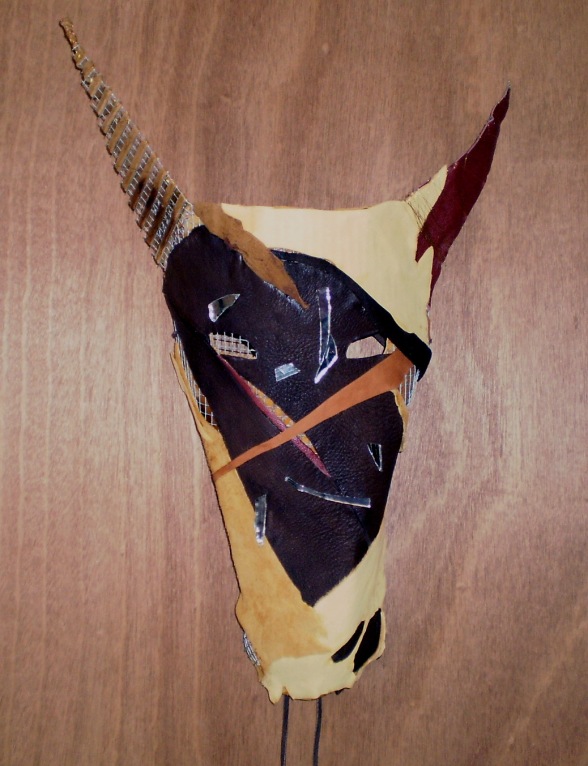
Previous incarnation of Dionysos’ shrine, since simplified (and expanded)
There seems to be a new trend in the pagan blogosphere of sharing what one’s daily devotions look like. I like it. (Plus, it’s far healthier than the other bandwagons I’ve jumped on lately.)
Many who have shared are hardcore mystics and spirit workers. My practice is much simpler than theirs, though I wouldn’t quite call myself a lay person – I feel called to a much more involved practice, but I am only just beginning on my path. (Despite 20+ years of paganism!)
So here’s what my day looks like right now, religiously:
I wake up in the morning, get a cup of coffee and check out my blog roll. Often this means I’ll quickly find myself bogged down in the pagan dramas of the day. To avoid this, I try to pick one or two things to read that look inspiring or at least interesting.
(After all, I can always pop me some popcorn and read the train wreck later if I really want to.)
Once I’m fully awake I shower or – depending on the occasion and need – at least wash my face and hands. Then I dress in my normal clothes for the day, gather my offerings and go to Dionysos’ shrine. I’ll take a minute to prepare the shrine – tidying up, putting incense in place, lighting the candle – then I step away.
Then its time to get my head in order. I’ll go over any prayer I intend to recite in my mind, then let it go. I focus my thoughts I Dionysos alone. When I feel ready, I approach the shrine (a processional of maybe 4 steps, but it is effective) and raise my arms in prayer.
I am not a poet. I begin by reciting a written prayer, usually Orphic hymn #30, but others – ancient or modern – as I feel inspired to. (If I make a mistake in the recital, I will step away from the shrine and begin again, unless the spirit draws me onrward.)
Then I offer thanks. I do this in my own words. I thank Him for the many blessings He bestows on the world and upon myself, and for specific gifts and blessings as appropriate. I asking Him to accept my offerings, and with them my love and gratitude.
For offerings, in the morning I always offer incense. I will add to this as inspired – most often wine, of course, but other items as well. They are usually pretty traditional.
After I make the offerings, I speak to Him from my heart, offering praise and sometimes discussing my concerns of the moment – though I usually leave those for less formal prayers throughout the day.
I like to chose and epithet of His and spend a few moments in meditation on it. It will stay with me throughout the day, keeping my thoughts with Him. (I haven’t been doing this part as much as I’d like of late, though.)
I offer praise a final time and leave the shrine (backing away the first few steps as I believe it is rude to turn one’s back on a God.)
If it is a morning where I will have to leave for work right away, I will return and blow out the candle immediately. Otherwise I leave it burning at least until the incense is done.
Then I finish my mundane rituals for the morning – make up, shoes, occasionally even breakfast – and spend some time with my family.
Before I leave for work (or on days off, immediately following my time with Dionysos) I approach my hearth shrine – the one in the public portion of the house – tidy it, light the candle, and make sure offerings are in reach.
Then I step away again and focus my thoughts on the Gods.
I return to the shrine and pray, using some variation of the following (my own, pardon the plainness):
I pray to Hestia, the great Goddess of the Hearth and Home
I pray to the household Gods and the Agathos Daimon
I pray to the Theoi who dwell on Olympus, greatest Gods of all
I thank You for another day, and for the many blessings you bestow upon the world and upon myself and my family
I will add my thanks for specific blessings as appropriate.
I then ask Them to accept my offerings, always incense and pure water* but often other things as well – olive oil, herbs, essential oils.
I pray that They will watch over, bless, and protect myself, my family, and our home on that day and the days to come.
Then I will offer praise to them, and back away from the shrine. (Returning to blow out the candle immediately if I am leaving right away.)
Throughout the day, I will offer informal prayers to the Gods as inspired, often speaking to Dionysos rather casually about my thoughts and concerns or simply that might be of interest to Him. I try to be open to His (and Their) presence in the world, though the challenges of modern life make this easier said than done.
When I visit places that remind me of him I will offer a greeting – for example, there is an “ivy tree” on the path I walk from my work to the bank every week.
(That’s pretty much all I do every day right now. The following are practices I have done but have become sporadic due to the demands of life. I am in the process of reinstating them.)
When I return home, I will burn incense at the hearth shrine for the Agathos Daimon.
Before retiring for the evening, I will return to Dionysos’ shrine for “quality time.” (Not that the morning devotions aren’t “quality” as well.) This is where I offer wine or whatever spirits I have on hand and share a glass with Him. I will meditate, dance, listen to music. I try to remain open to Him throughout the rest of the evening as I go more mundane things and “family time.”
If I have any questions for Him I will mull them over in my mind as I fall asleep, hoping for a moment of clarity between sleeping and waking. I rarely have dreams from any of the Gods.
That’s it. I’ve felt a pull for quite some time to begin honoring my ancestors and beloved dead, but I’m at a loss how to begin. The same is true of the nymphs and land spirits, and other deities I wish to honor more directly.
I will do these things in time, but right now I have to remind myself that I am still recovering and my practice is growing slowly. Rather than jump in with both feet and fail – as I have done many, many times in the past – I am trying to establish practices and show that I can stick with them before adding on something new.
So, um, anyone else feel like sharing?
*On water offerings: I know that several people take issue with this practice on the grounds that in the west, pure water is so abundant and readily available that it is not a real sacrifice. I choose to make these offerings for the following reasons:
– Water is a powerful substance. Without it, there would be no life on earth. It is one of the greatest gifts of the Gods.
– I understand “sacrifice” to mean to make holy. Any sense of hardship on the part of the one making the offerings is secondary at best.
– I have been poor enough in the very recent past – while living in a desert no less – that, even if I were to subscribe to the more common meaning of “sacrifice,” I have no illusions about the ready availability of necessities like food, water, and shelter. Even in the industrial west.
- I’ll Show You Mine If…(tessdawson.blogspot.com)
- A Day in the Life (Heathen Heretic)
- What does a Sannion do? (thehouseofvines.com)






